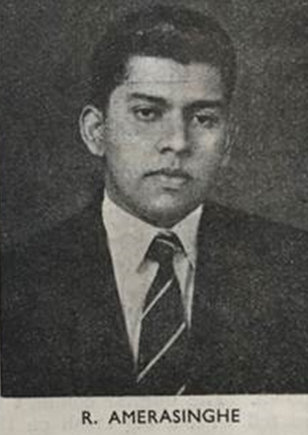AN ENDURING LEGACY – THE LIFE OF JUSTICE RANJIT AMERASINGHE – by Bernard VanCuylenburg

Justice Ranjit Amerasinghe
PROLOGUE.
 “A legacy is etched into the minds of others and the stories they share about you”. This quotation by Shannon Alder the inspirational and oft quoted Author, goes a long way in describing Justice Ranjit Amerasinghe who had a passion for the Law, and in the words of Alder, carved his name not on tombstones but on hearts. A Supreme Court Justice in the USA the late Ruth Ginsburg, once told law students that they should use their degree – quote – “to make things better for other people. Lawyers committed to representing and helping their clients will find meaning and success in their professional life”. Ranjit went more than the extra mile in achieving, even surpassing this lofty ideal.
“A legacy is etched into the minds of others and the stories they share about you”. This quotation by Shannon Alder the inspirational and oft quoted Author, goes a long way in describing Justice Ranjit Amerasinghe who had a passion for the Law, and in the words of Alder, carved his name not on tombstones but on hearts. A Supreme Court Justice in the USA the late Ruth Ginsburg, once told law students that they should use their degree – quote – “to make things better for other people. Lawyers committed to representing and helping their clients will find meaning and success in their professional life”. Ranjit went more than the extra mile in achieving, even surpassing this lofty ideal.
A historical note is necessary to set the scene for the genesis of Ranjit’s academic career and the heights he scaled in the field of Law. The ancient city of Kurunegala 54 kilometers from Kandy was once the royal capital of Lanka from the end of the 13th century to the start of the 14th century and four Kings ruled the island from this capital. This city had a special link with Saint Anthony’s College Kandy, because over the years many students who attended this great College by the Mahaveli hailed from Kurunrgala, and Ranjit was one of them.
Citing my own experience, in eleven years as a boarder I have lost count of those Anthonians whose home town was Kurunegala. And Ranjit came from a famous family who was associated with the college for several generations. His Grandfather and Grand Uncle had served on the committees of the Old Boys Association since its inception. It was natural as night follows day, that St.Anthony’s became his Alma Mater, and he began his academic journey with zeal and determination to succeed. He also took an interest in Sports and became the Champion Athlete at the age of 16 when he participated in the College Sports Meet.
Setting his priorities in perspective, he gave up sports to concentrate on his studies which paid handsome dividends when he was awarded direct admission to the University at the age of 18 years. In those days, admission to the University was usually after a Viva Voce. This term derives from medieval Latin meaning “The Living Voice”. It was usually used in terms of Voting with a “Yea” or a “Nay” as is done in the American Congress. His Superiors knew an exceptional talent when they saw one because Ranjit was exempted from this form of voting/admission. Having topped his batch at the University in law, he was appointed to the Staff and according to an article written by Mr.George Denlow in the Anthonian Newsletter, he became the first Anthonian to be a permanent member on the staff of the Ceylon University.
In the centenary year of the college 1954, Ranjit was the Head Prefect. That year the Chief Guest at the Prize Giving was Viscount Soulbury the last British Governor General of Ceylon. On this occasion Ranjit proposed the Vote of Thanks.
On leaving college he took his oaths as an Advocate of the Supreme Court. He did not practice in Ceylon as the country was known then, but appeared in the Privy Council in certain cases on appeal from the local courts. He was awarded a Bachelor of Literature (BLit.) research degree from Oxford University and later obtained his PHD from the University of Ceylon. In later life he was also awarded a Doctor of Letters Degree (LLD), “Honoris Causa” by the University of Colombo. The term means “For the sake of Honour” and is used especially in the names of academic degrees.
By this time Ranjit’s reputation was a household name in the field of Jurisprudence and his erudition won him many awards. Serving in several capacities, he was at one time the Assistant Secretary General of the Afro Asian Consultative Committee which was based in New Delhi. He was Chief Legal Officer/General Manager of the Sri Lanka Insurance Corporation and “Title Insurance” was his brainchild. He published a book on the subject in which his proposals were amplified. “Title Insurance” is a form of Indemnity Insurance that protects lenders and home buyers from financial loss sustained from defects in a title to a property. Title Insurance has since been a boon for thousands of home builders who would not have been able to obtain a loan, given the lending criteria by the Banks at the time. He followed this with a well researched Book on “Public Corporations in Sri Lanka”.
It was about this time that his talents were sought by lands further afield….in the exotic Fiji Islands to be precise. He served in Fiji as a Consultant appointed by the Commonwealth Fund for Technical Co-operation advising the government on insurance laws and he subsequently wrote a book on the Laws for Fiji and drafted the legislation on Insurance. Added to these responsibilities he was also appointed as Insurance Commissioner for Fiji and Regional Advisor to the Central, Southern, and Pacific nations.
More appointments highlighting the respect one had for his capabilities followed. He was appointed a Senior Economic Adviser for UNCTAD (United Nations Conference on Trade and Development) in Geneva, and the Commonwealth Secretariat Adviser to the South Pacific Bureau for Economic Co-operation.
On his return to Sri Lanka he was invited by the government to join the Ministry of Justice as its Secretary and was at one stage the Secretary General of the National Commission for UNESCO (The United Nations Educational Scientific and Cultural Organization).
A hallmark of his working life was that Ranjit took intense pleasure in perfection and in order to leave his footprint in the Hills of Hulftsdorp he wrote a history of the Supreme Court which is a monumental work by any standards, not only of the Supreme Court, but of the legal history of the nation. He wrote over a dozen books and presented many articles on a range of topics which are academically acclaimed as masterpieces. The subjects covered were wide and varied. He wrote on the Legal Heritage of Sri Lanka, Ethics for Lawyers and Judges, and on several technical issues covering Defamation and Personal Injuries. To top it all he also acted as The Chief Justice whenever the latter was abroad, and also made a valuable contribution on the Council of Legal Education.
In 1988 he was appointed to serve on The Supreme Court which he did with a distinguished record of service. His judgements are read by students for the thoroughness of his thinking, his analytical skills, clarity of presentation, and above all the sociological importance of what lay behind his thinking. A classic example of this was his monumental judgement in the Eppawela
Phosphate case which laid down the principle often quoted now, that Government cannot ignore its responsibility to unborn generations, that non-renewable resources should be preserved.
Ranjit was also the Chairman of the Law Commission and was in the first Constitutional Commission. On a lighter note it must be mentioned that he was very versatile on the Keyboards, a skill which was well recognized and appreciated. He was also a connoisseur of fine wines and other beverages. Ranjit was called to his eternal reward on the 18th of January 2013 at 76 years of age, and left a world in mourning. A Philosopher once remarked ” You can write a hundred books and read an equal number on ‘Wisdom’. But unless you apply what you learned, then its only words on a page. Life is not lived with intentions but by action”. Ranjit lived this adage to the maximum.
Regarding the many books he wrote, I can only quote a line by a famous critic “Books open the doors that others have closed to you”. And the many doors that Justice Amerasinghe opened remain open to this day, and will stay that way for future generations.
PROLOGUE.
I was privileged to pen this article because I remember Ranjit Amerasinghe who was a senior student at Saint Anthony’s College Kandy, when I joined in January 1951 as a six year old. I met him only on three occasions in College because he was the batch mate of a cousin of mine. I am very grateful to Frankie Amerasinghe his younger Brother who was with me in College and gave me the relevant information to put flesh on the bone of this article. I remember the College Magazine of 1951 published an article or two about Ranjit’s academic progress.
I crave the reader’s indulgence if I strike a personal note here for sentimental reasons. Referring to the Prize Giving in 1954 when Viscount Soulbury was the Chief Guest, this is one Prize Giving I remember well because my Brother Errol who joined College in 1953 and was six years old, received a prize from Viscount Soulbury. He was the toast of our family after he received his prize !
With Justice Amerasinghe’ s passing, the Nation lost a Jurist of historic stature, and the Supreme Court a cherished colleague and a rock of righteousness.
Bernard VanCuylenburg.







